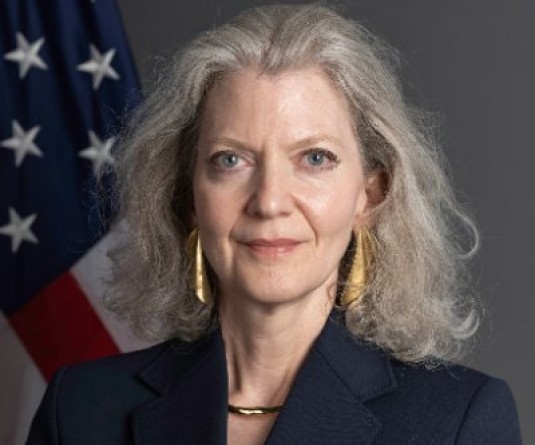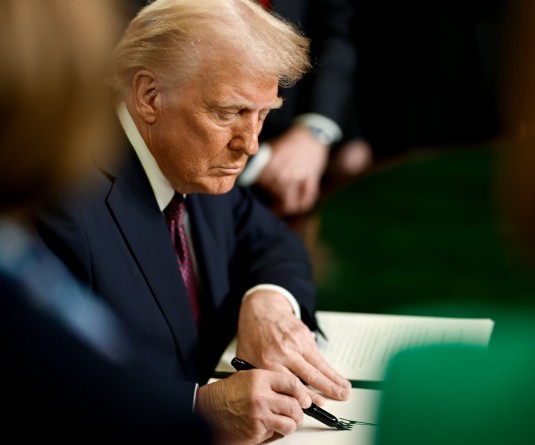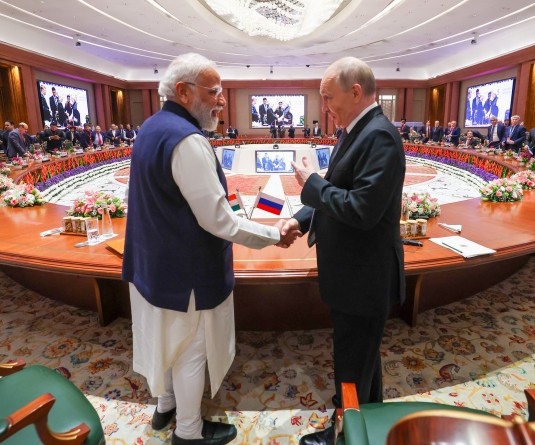
A Libyan rebel has the rebel flag painted on his fingers as he flashes the vicory sign on the front line outside of Bin Jawaad, 150 km east of Sirte, central Libya on Monday, March 28. (AP Photo)
BIN JAWAD, Libya, March 28 (AFP): Loyalist troops Monday halted a rebel advance on Moamer Kadhafi's home town Sirte, which was pounded overnight by coalition jets after NATO took command of military operations in Libya.
An AFP reporter said rebels who for the past two days have raced westwards towards Sirte came under heavy machine-gun fire from regime loyalists in pick-up trucks on the road from Bin Jawad to Nofilia.
The rebels on Sunday seized Bin Jawad, 140 kilometres (85 miles) east of Sirte, after retaking the key oil town of Ras Lanuf as they advanced with the support of coalition air strikes on Kadhafi's forces. After coming under fire on Monday, the insurgents pulled back into Bin Jawad and opened up with heavy artillery.
An AFP reporter said nine powerful explosions early Monday rocked Sirte, 360 kilometres (225 miles) east of Tripoli, as warplanes flew overhead and the coalition operation to enforce a no-fly zone in Libya entered its ninth day. The explosions, between 0420 GMT and 0435 GMT, followed two loud blasts on Sunday evening blamed by state television on an air raid by coalition forces.
NATO finally took full command of military operations in Libya from a US-led coalition on Sunday, enabling the alliance to strike at Kadhafi forces should they threaten civilians. Alliance officials cautioned, however, that the transfer of command would take 48 to 72 hours.
Pressed by Western powers, notably the United States and Italy, to take the helm as swiftly as possible, ambassadors from the 28-nation alliance approved the transfer after overcoming French and Turkish concerns.
"Our goal is to protect civilians and civilian-populated areas under threat of attack from the Kadhafi regime," said NATO Secretary General Anders Fogh Rasmussen. "NATO will implement all aspects of the UN resolution. Nothing more, nothing less," he said.
The command transfer came as Tripoli also came under attack by what state television called "the colonial aggressor," hours ahead of US President Barack Obama's planned address Monday in Washington to explain US involvement. Witnesses in the capital said the strikes targeted the road to the airport 10 kilometres (six miles) outside the city, as well as the Ain Zara neighbourhood on its eastern outskirts.
The rebels promised the uprising would not further hamper oil production in areas under their control, and the opposition plans to begin exporting oil "in less than a week," a rebel representative said. "We are producing about 100,000 to 130,000 barrels a day, we can easily up that to about 300,000 a day," Ali Tarhoni, the rebel representative responsible for economy, finance and oil, told a news conference.
The rebels, on the verge of losing their Benghazi stronghold before the air strikes began on March 19, on Saturday seized back Ajdabiya and Brega, 160 and 240 kilometres (100 and 150 miles) to the west. Spurred on by the air war, the rag-tag rebel band thrust another 100 kilometres past Brega to win back Ras Lanuf, routing Kadhafi loyalists.
Jubilant rebels stuck up a poster of Kadhafi after they had taken the hamlet of Bin Jawad and took potshots at it with assault rifles as a green Libyan regime flag burned and a group of about 100 chanted: "Moamer, you're a dog." "Kadhafi's forces are now scared rats," Mohammed Ali el-Atwish, a bearded 42-year-old fighter, told AFP.
The rebels marked the takeover of Ras Lanuf with celebratory gunfire and fired a rocket-propelled grenade in a sign of victory. One of them, Attia Hamad, 34, said insurgents were in full control of the town. "All of it is in our hands," Hamad said of Ras Lanuf, which Kadhafi forces had overrun on March 12. Loyalists were "retreating so quickly, they are leaving some fighters behind."
Foreign ministers from more than 35 countries have so far confirmed they will attend a London conference on Tuesday to discuss coalition military action against Libya, Britain said. Many Libyan diplomats and military leaders are defecting, US Secretary of State Hillary Clinton said.
"We have a lot of diplomats and military leaders in Libya who are flipping, changing sides, defecting," she told CBS television. Defence Secretary Robert Gates said intervention in Libya was not vital to US interests, but explained: "You had a potentially significantly destabilising event taking place in Libya that put at risk potentially the revolutions in both Tunisia and Egypt." He added: "Egypt is central to the future of the Middle East."
Elsewhere, Gates reiterated that regime change was not part of the military mission in Libya. "As we've seen in the past, regime change is a very complicated business, sometimes it takes a long time, sometimes it can happen very fast. But it was never part of the military mission" in Libya, he told ABC television.
In Tripoli, government spokesman Mussa Ibrahim said overnight that the Western-led air strikes were killing soldiers and civilians between the strategic town of Ajdabiya and Sirte. "We are losing many lives, military and civilians," Ibrahim added, while renewing a call for a ceasefire and an urgent meeting of the UN Security Council, which approved military action to stop the regime's attacks on civilians.
Opposition representatives in Benghazi, meanwhile, were trying to form a government-in-waiting.
At present, the official voice of Libya's opposition rests with the so-called Provisional Transitional National Council (PTNC), a group of 31 members representing the country's major cities and towns. Of the 31, the names of only 13 have been publicly revealed: council spokesmen argue it is still too dangerous to identify members in areas still controlled by Kadhafi.
An AFP reporter said rebels who for the past two days have raced westwards towards Sirte came under heavy machine-gun fire from regime loyalists in pick-up trucks on the road from Bin Jawad to Nofilia.
The rebels on Sunday seized Bin Jawad, 140 kilometres (85 miles) east of Sirte, after retaking the key oil town of Ras Lanuf as they advanced with the support of coalition air strikes on Kadhafi's forces. After coming under fire on Monday, the insurgents pulled back into Bin Jawad and opened up with heavy artillery.
An AFP reporter said nine powerful explosions early Monday rocked Sirte, 360 kilometres (225 miles) east of Tripoli, as warplanes flew overhead and the coalition operation to enforce a no-fly zone in Libya entered its ninth day. The explosions, between 0420 GMT and 0435 GMT, followed two loud blasts on Sunday evening blamed by state television on an air raid by coalition forces.
NATO finally took full command of military operations in Libya from a US-led coalition on Sunday, enabling the alliance to strike at Kadhafi forces should they threaten civilians. Alliance officials cautioned, however, that the transfer of command would take 48 to 72 hours.
Pressed by Western powers, notably the United States and Italy, to take the helm as swiftly as possible, ambassadors from the 28-nation alliance approved the transfer after overcoming French and Turkish concerns.
"Our goal is to protect civilians and civilian-populated areas under threat of attack from the Kadhafi regime," said NATO Secretary General Anders Fogh Rasmussen. "NATO will implement all aspects of the UN resolution. Nothing more, nothing less," he said.
The command transfer came as Tripoli also came under attack by what state television called "the colonial aggressor," hours ahead of US President Barack Obama's planned address Monday in Washington to explain US involvement. Witnesses in the capital said the strikes targeted the road to the airport 10 kilometres (six miles) outside the city, as well as the Ain Zara neighbourhood on its eastern outskirts.
The rebels promised the uprising would not further hamper oil production in areas under their control, and the opposition plans to begin exporting oil "in less than a week," a rebel representative said. "We are producing about 100,000 to 130,000 barrels a day, we can easily up that to about 300,000 a day," Ali Tarhoni, the rebel representative responsible for economy, finance and oil, told a news conference.
The rebels, on the verge of losing their Benghazi stronghold before the air strikes began on March 19, on Saturday seized back Ajdabiya and Brega, 160 and 240 kilometres (100 and 150 miles) to the west. Spurred on by the air war, the rag-tag rebel band thrust another 100 kilometres past Brega to win back Ras Lanuf, routing Kadhafi loyalists.
Jubilant rebels stuck up a poster of Kadhafi after they had taken the hamlet of Bin Jawad and took potshots at it with assault rifles as a green Libyan regime flag burned and a group of about 100 chanted: "Moamer, you're a dog." "Kadhafi's forces are now scared rats," Mohammed Ali el-Atwish, a bearded 42-year-old fighter, told AFP.
The rebels marked the takeover of Ras Lanuf with celebratory gunfire and fired a rocket-propelled grenade in a sign of victory. One of them, Attia Hamad, 34, said insurgents were in full control of the town. "All of it is in our hands," Hamad said of Ras Lanuf, which Kadhafi forces had overrun on March 12. Loyalists were "retreating so quickly, they are leaving some fighters behind."
Foreign ministers from more than 35 countries have so far confirmed they will attend a London conference on Tuesday to discuss coalition military action against Libya, Britain said. Many Libyan diplomats and military leaders are defecting, US Secretary of State Hillary Clinton said.
"We have a lot of diplomats and military leaders in Libya who are flipping, changing sides, defecting," she told CBS television. Defence Secretary Robert Gates said intervention in Libya was not vital to US interests, but explained: "You had a potentially significantly destabilising event taking place in Libya that put at risk potentially the revolutions in both Tunisia and Egypt." He added: "Egypt is central to the future of the Middle East."
Elsewhere, Gates reiterated that regime change was not part of the military mission in Libya. "As we've seen in the past, regime change is a very complicated business, sometimes it takes a long time, sometimes it can happen very fast. But it was never part of the military mission" in Libya, he told ABC television.
In Tripoli, government spokesman Mussa Ibrahim said overnight that the Western-led air strikes were killing soldiers and civilians between the strategic town of Ajdabiya and Sirte. "We are losing many lives, military and civilians," Ibrahim added, while renewing a call for a ceasefire and an urgent meeting of the UN Security Council, which approved military action to stop the regime's attacks on civilians.
Opposition representatives in Benghazi, meanwhile, were trying to form a government-in-waiting.
At present, the official voice of Libya's opposition rests with the so-called Provisional Transitional National Council (PTNC), a group of 31 members representing the country's major cities and towns. Of the 31, the names of only 13 have been publicly revealed: council spokesmen argue it is still too dangerous to identify members in areas still controlled by Kadhafi.
Syrian parliament urges Assad to clarify ‘reforms’
DAMASCUS, March 28 (AFP): Syria's parliament has asked President Bashar al-Assad to explain in detail a string of reforms promised in response to a wave of popular dissent across the country, an MP said Monday.
"On Sunday night, MPs requested that the president clarify the measures that authorities have announced and urged him to address parliament and explain," MP Mohammed Habash told AFP. Parliamentarians also held a minute of silence, he said, to honour those killed in two weeks of unrest in Syria, where demonstrators earlier this month began taking to the streets to demand change.
The security situation in the country has worsened in past days, with reports of gangs wreaking havoc in the northern port city of Latakia and sporadic bouts of violence in the southern governorate of Daraa. Rights groups have put the death toll at around 130, with Daraa -- a tribal area at the Jordanian border -- sustaining the most casualties.
Authorities have accused Muslim fundamentalists of aiming to incite sectarian-based strife in Syria, a majority Sunni Muslim country which is also home to Christians, Druze and Alawite Muslims. Presidential adviser Buthaina Shaaban on Sunday told AFP Assad, who is facing unprecedented domestic pressure in his 11-year rule, was expected to address his nation in the days to come.
Authorities on Thursday had said Syria has decided to end emergency rule, which has been in force since the Alawite-controlled Baath came to power in 1963.
DAMASCUS, March 28 (AFP): Syria's parliament has asked President Bashar al-Assad to explain in detail a string of reforms promised in response to a wave of popular dissent across the country, an MP said Monday.
"On Sunday night, MPs requested that the president clarify the measures that authorities have announced and urged him to address parliament and explain," MP Mohammed Habash told AFP. Parliamentarians also held a minute of silence, he said, to honour those killed in two weeks of unrest in Syria, where demonstrators earlier this month began taking to the streets to demand change.
The security situation in the country has worsened in past days, with reports of gangs wreaking havoc in the northern port city of Latakia and sporadic bouts of violence in the southern governorate of Daraa. Rights groups have put the death toll at around 130, with Daraa -- a tribal area at the Jordanian border -- sustaining the most casualties.
Authorities have accused Muslim fundamentalists of aiming to incite sectarian-based strife in Syria, a majority Sunni Muslim country which is also home to Christians, Druze and Alawite Muslims. Presidential adviser Buthaina Shaaban on Sunday told AFP Assad, who is facing unprecedented domestic pressure in his 11-year rule, was expected to address his nation in the days to come.
Authorities on Thursday had said Syria has decided to end emergency rule, which has been in force since the Alawite-controlled Baath came to power in 1963.






